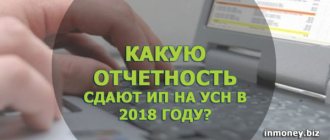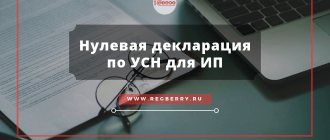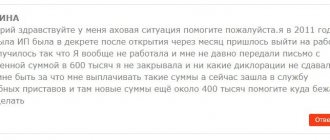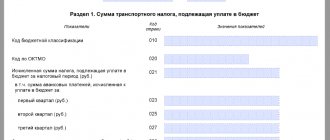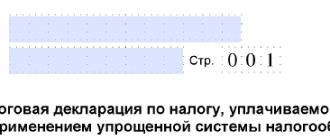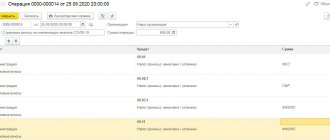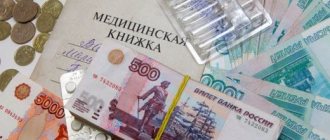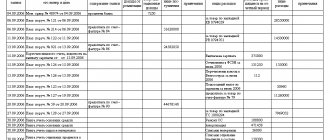Deadlines for submitting reports to the simplified tax system “income”
Simplified annual declarations are submitted by:
- no later than March 31 of the year following the reporting year - if the simplifier is a legal entity;
- no later than April 30 of the year following the reporting year - if the simplifier is an individual entrepreneur.
In 2021, the deadlines for submitting a declaration under the simplified tax system for 2018 are:
- for legal entities - 04/01/2019 (postponement from Sunday, March 31);
- for individual entrepreneurs - 04/30/2019.
If you have lost your right to use the simplified tax system, submit your declaration by the 25th day of the month following the quarter in which you lost your right to use the simplified tax system. If you voluntarily refuse to use the simplified tax system, report by the 25th day of the month following the month of submitting the notice of refusal from the simplified tax system to the tax office.
Single simplified declaration 2021 – what is it?
Depending on which taxation regime the taxpayer applies, he is obliged to timely report on the taxes paid. In order to facilitate document flow, the Tax Code stipulates that in the absence (complete) of monetary transactions (by bank transfer and at the cash register) and taxable items, the company has the right to submit one general reporting form instead of several (clause 2 of Article 80 of the Tax Code of the Russian Federation).
The form called the Unified Simplified Tax Return in 2018 is submitted according to the form approved by Order of the Ministry of Finance No. 62n dated July 10, 2007. The report can only replace taxes such as: VAT, profit, simplified tax system, agricultural tax. In addition, it is possible to replace transport, land and property taxes, but if the company does not have the appropriate facilities, there is no need to report on these types of payments. As for the “imputation”, such a special regime does not allow the filing of “zeros”, which means that the EUD will not replace the quarterly UTII declaration.
Declaration form for the simplified tax system “income”
In 2021, a declaration form is in force, approved by order of the Federal Tax Service of February 26, 2016 No. ММВ-7-3 / [email protected] It is intended both for simplifiers who pay tax on income, and for simplifiers who pay tax on the difference between income and expenses .
For the simplified tax system “income” the following sections of the declaration are required to be completed:
- title page;
- Section 1.1, which records the amounts of advance payments and tax payable/reduced at the end of the year;
- Section 2.1.1, which indicates the amount of income, tax rate, taxpayer advances and paid insurance premiums, contributions under voluntary insurance contracts and disability benefits.
You may also need to complete Section 2.1.2 for the Trade Fee and Section 3 for the Taxpayer's Funding Report. These sections are filled out only if necessary: if you paid a trading fee during the year or received assets as part of charity or targeted financing (according to the provisions of Article 251 of the Tax Code of the Russian Federation).
USN “income” declaration form for 2021.
Rights and obligations of individual entrepreneurs, preferences and sanctions
A private entrepreneur is a businessman registered with the tax service and extra-budgetary funds, who operates within the legal framework of the Russian Federation without forming a legal entity. The Civil Code allows all capable citizens, starting from the age of 14, to conduct their business. The ban is only for the state. employees, law enforcement officers and military personnel.
The rights and obligations of private entrepreneurs within the framework of tax legal relations are regulated by the Tax Code of the Russian Federation, Articles No. 21 and No. 23.
An individual entrepreneur, as a full-fledged tax payer, can count on support and demand compliance with regulations from regulatory authorities, namely:
- Receive reliable and complete information about taxes, sanctions, and fees.
- Have open access to current tax return forms and the opportunity to receive explanations on their formation.
- Take advantage of tax benefits provided by federal, regional or local regulations.
- Receive a credit (refund) for amounts that were paid or collected in excess of the norm.
- Give comments on calculations and payment of taxes, ask questions on reports of desk audits.
- Demand that inspectors and management of the Federal Tax Service comply with the law.
- Contact higher authorities with complaints about the actions of inspection employees.
- Require tax authorities to maintain tax secrets in relation to individual entrepreneurs within the framework of the law.
- Receive tax deductions: standard, social, property and professional, if an individual entrepreneur receives additional income not related to his business, which is taxed at a rate of 13%.
An individual entrepreneur has certain responsibilities to the state and regulators. The main ones:
- Register with the Federal Tax Service at your place of registration (in most cases).
- If the activities of an individual entrepreneur are subject to licensing, obtain a license.
- Pay taxes on time.
- Keep proper records of income and expenses.
- Submit tax returns on time.
- Upon request of the Federal Tax Service, provide other reporting documents.
- In the case of business participation of an individual entrepreneur in Russian or foreign organizations, inform the Federal Tax Service about this within one month.
- Keep accounting and tax reports for at least four years.
Freedom is given to private businesses when choosing: to work through a current account or not, whether to carry out activities through a cash register, in which territory of the Russian Federation to conduct their business (there are exceptions for tax regimes), and whether to develop a corporate name.
To conduct business competently, individual entrepreneurs need to know their rights and responsibilities.
With all the advantages over other forms of entrepreneurship, individual entrepreneurs have one big disadvantage, or rather even a risk. When opening his own business, all losses, debt obligations to the budget, extra-budgetary funds, as well as counterparties will fall on his shoulders if something goes wrong. The individual entrepreneur will be forced to pay off all debts with his property, regardless of whether the property is involved in business activities. At the same time, financial responsibility for mistakes will not be canceled even when the individual entrepreneur is deregistered. All obligations will pass to him as an individual.
Let's consider the articles of the Tax Code of the Russian Federation, which stipulate the types of violations when declaring income and submitting reports to individual entrepreneurs, as well as the responsibility of the entrepreneur. The requirements of the code apply to all taxation systems (OSNO, simplified tax system, unified agricultural tax, UTII) and to all types of reporting. Illegal actions of an individual entrepreneur may result in sanctions from regulators for each violation:
- untimely submission of tax and statistical reporting (or lack thereof);
- submission of incorrect data when submitting declarations, when an entrepreneur deliberately understates his income or overstates expenses, reducing the tax base.
To avoid sanctions for violations, it is recommended to pay tax debts within eight working days from the date the debt arose or upon receipt of a request from the Federal Tax Service (if an error is discovered). You should not hope that if cards or accounts are blocked, you will be able to open a new current account and continue working. No bank will do this, since it does not have the right to open accounts for clients who have such problems. And this information is always checked when opening a bank account.
An individual entrepreneur who delayed the declaration for 10 days faces blocking the account
If the tax inspectorate sues a willful defaulter, if the debt is more than 10 thousand rubles, individual entrepreneurs may be blocked from traveling abroad (however, like any individual entrepreneur).
The most serious sanctions for the debtor may occur after one year after receiving demands for tax payment - the Federal Tax Service has the right to begin forced collection of debt at the expense of the property of individual entrepreneurs and even the private property of individuals. faces.
It is worth noting that tax regulators are taking away more and more power. If previously they controlled only budget payments, then in 2021 all extra-budgetary contributions are also under their control. Control of deadlines and requirements of the Tax Code of the Russian Federation is becoming increasingly strict, sanctions follow immediately, and it is becoming increasingly difficult to avoid them.
Table: sanctions for violation of the Tax Code of the Russian Federation in terms of declaration and reporting
| Article | Violation | Fine, rub. | Comments |
| Tax Code of the Russian Federation. Article 119. | Failure of the individual entrepreneur’s tax return to be submitted to the Federal Tax Service within the prescribed period | 1000 | Or 5% of the tax for each month. Plus freezing of a bank account (bank card, including an individual) |
| Art. 119.1. | Wrong way to submit a declaration | 200 | If there are requirements to submit via EDI |
| Tax Code of the Russian Federation. Article 120. | Gross violation of the requirements for accounting for income, expenses, and taxable items | 10000 | If committed during one tax period |
| Violations if they occurred over more than one period | 30000 | ||
| The same actions when they provoked an understatement of the tax base | 40000 | Or 20% of the tax amount (minimum 40 thousand rubles) | |
| Tax Code of the Russian Federation. Article 122. | Non-payment of tax, partial payment of tax, when the tax base is underestimated in the declaration or the tax calculation is carried out incorrectly | 20% of the debt amount | |
| The same violation as in paragraph 1, but committed intentionally | 40% of the debt amount |
The procedure for filling out the simplified taxation system “income” declaration
The procedure for filing a declaration is specified in Appendix 3 to the Federal Tax Service order No. ММВ-7-3/ [email protected]
Let's remember the general rules:
- Amounts are indicated in full rubles, rounded according to the rules of mathematics: 50 kopecks or more are rounded to a full ruble.
- The declaration has continuous numbering.
- We do not provide sheets and sections with no indicators.
- If you fill out the declaration by hand, the ink must be black, purple or blue. You cannot correct errors with the corrector. We recommend that if an error is discovered, you rewrite the sheet where the error was made.
- If you fill out the declaration on a computer and then print it out, then double-sided printing is not allowed. We fasten the declaration sheets only with a paper clip, not with a stapler.
- We fill in the indicators from left to right, starting from the leftmost cell. But if you fill out the declaration using a program for keeping records and submitting reports, align the numerical indicators to the right margin of the report.
- Text fields should be filled in capital block letters.
- If the indicator is missing, put a dash in the corresponding line of the declaration. If a line is not completely filled in, then also put a dash in the unfilled cells of the line.
- On each page of the declaration, indicate the tax identification number (required) and checkpoint (if any).
The procedure for filling out the title page of the simplified tax system declaration “income”
When filling out the title page, please indicate your Taxpayer Identification Number and Taxpayer Identification Number. If the report is submitted by the successor organization for a reorganized company, indicate the TIN and KPP of the legal successor, and in the field “Taxpayer” and “TIN/KPP of the reorganized organization” - the name, TIN and KPP of the reorganized company.
If you are submitting a declaration for the first time during the reporting period, in the “Adjustment number” field, enter “0 – -”; if you are submitting an update, indicate the serial number of the update.
The tax period code when submitting the simplified tax system “income” declaration for 2018 is 34.
Also put on the title page:
- the year for which the declaration is provided;
- tax authority code;
- full name of the company or line by line full name of the entrepreneur;
- activity code according to OKVED-2;
- taxpayer's telephone number;
- number of pages in the declaration;
- the number of additional sheets - for example, a power of attorney confirming the authority of the taxpayer’s representative.
If the report is submitted by the head of the company or individual entrepreneur personally, in the field “I confirm the accuracy and completeness of the information specified in this declaration” should be put 1, if the representative - 2.
Also on the title page is the full name of the head of the organization, his personal signature and the date of signing the report. Entrepreneurs do not re-indicate their full name, but only sign and set the date of signing. If the report is submitted by a representative of the taxpayer, then he indicates his full name line by line, signs and dates it. You will also need to provide a document confirming the authority of the taxpayer's representative.
In turn, tax officers on the title page of the simplified taxation system “income” declaration fill out the method of submitting the declaration, the number of pages in it, the number of sheets of attached documents, the date of filing the declaration, the full name and signature of the inspector who accepted the declaration.
Unified simplified tax return - who submits it?
As a rule, a simplified declaration in the absence of activity in 2018 is used by newly registered entities (legal entities or individual entrepreneurs). If the company has not yet received income, but has already managed to carry out transactions on a bank account, or at the cash desk using cash settlement services, in this case the EUD cannot be applied.
Who will submit the unified simplified declaration in 2021 - examples:
- Enterprises or individual entrepreneurs on the general OSNO regime with a complete absence of movements in the accounts and at the cash desk, as well as not having taxable objects for the taxes included in the EUD.
- Companies or individual entrepreneurs under a special simplified taxation system or unified agricultural tax regime - also subject to compliance with regulatory conditions.
Note! Regardless of the fact, who submits a single simplified tax return in 2021 is not allowed to include personal income tax in its tabular part. This is due to the fact that income tax reporting is submitted by tax agents in a special manner.
The procedure for filling out section 1.1 of the simplified tax system declaration “income”
Fill out Section 1.1 of the simplified tax system declaration for 2021 as follows:
| Line numbers | Information to fill out | Note |
| 010, 030, 060, 090 | OKTMO at the location of the company/place of residence of the individual entrepreneur. | You can determine this on the Federal Tax Service website. Line 010 is always filled in, lines 030, 060, 090 - only if there was a change in OKTMO. If OKTMO has not changed, there should be a dash in lines 030, 060, 090 |
| 020 | Advance amount for simplified tax for the 1st quarter of 2021 | |
| 040 | Advance amount for simplified tax for the 1st half of 2018 | |
| 050 | The amount of advance payment for simplified tax to be reduced based on the results of the 1st half of 2021 | Fill in if the advance for half a year is less than the advance for the 1st quarter of 2018 |
| 070 | Advance amount for simplified tax for 9 months of 2021 | |
| 080 | The amount of advance payment for simplified tax to be reduced based on the results of 9 months of 2021 | Fill in if the advance for 9 months is less than the advances for previous periods |
| 100 | Additional tax for 2021, taking into account previously paid advances | Taxpayers who have lost the right to the PSN and switched to the simplified tax system indicate in this line the simplified tax minus the cost of the “unspent” patent (letter of the Federal Tax Service of Russia dated June 29, 2017 No. SD-4-3 / [email protected] ). |
| 110 | Tax to be reduced for 2021, taking into account previously paid advances |
The procedure for filling out section 2.1.1 of the simplified tax system declaration “income”
Section 2.1.1 is filled out as follows:
| Line numbers | Information to fill out | Note |
| 102 | 1 - if the company or individual entrepreneur has employees; 2 - if the individual entrepreneur does not have employees | A simplifier who has employees reduces advances and tax under the simplified tax system on insurance premiums and employee benefits by no more than half. A simplified individual entrepreneur without employees can reduce the tax on insurance premiums completely |
| 110-113 | Amounts of income received on an accrual basis for the 1st quarter, half year, 9 months, year | Income is determined in accordance with Art. 346.15 Tax Code of the Russian Federation |
| 120-123 | Tax rate | Indicated in accordance with Art. 346.20 Tax Code of the Russian Federation. May be reduced by regional legislation |
| 130 | Advance amount for the 1st quarter of 2021 | Line 110 * line 120 /100 |
| 131 | Cumulative advance amount for the 1st half of 2021 | Line 111 * line 121 /100 |
| 132 | Cumulative advance amount for 9 months of 2021 | Line 112 * line 122 /100 |
| 133 | Cumulative tax amount for the year | Line 113 * line 123 /100 |
| 140-143 | The amounts of insurance premiums paid to employees of disability benefits and the amount of contributions for voluntary insurance for the 1st quarter, half a year, 9 months and 2021, respectively | Individual entrepreneurs without employees indicate the amounts of pension and health insurance contributions paid for themselves for the 1st quarter, half-year, 9 months and year, respectively |
Reducing the simplified tax system due to contributions for individual entrepreneurs and for employees
When determining the amount of tax, there is a legal way to reduce it. This is especially true for entrepreneurs who use the “Income” system. In this case, the percentage of reduction depends on the presence or absence of attracted employees.
If an individual entrepreneur uses the “Income” system, then the following rules are used to reduce:
- An entrepreneur without employees can reduce the entire tax amount, but with hired employees - by no more than 50%.
- The tax can be reduced by the following contributions: Fixed payments of individual entrepreneurs for themselves (in 2021 their amount will be 32,385 rubles);
- 1% of income received more than 300 thousand rubles;
- Listed contributions for employees to the pension fund, medical insurance, social insurance and injury;
- Sick leave paid for the first 3 days;
- Contributions for employees for voluntary health insurance.
To optimally reduce the amount of tax for individual entrepreneurs who use the simplified tax system for income, it is more profitable to transfer contributions for yourself quarterly in different amounts.
You might be interested in:
Balance sheet - form 1: how to fill it out correctly, what errors occur
When using the “Income reduced by expenses” system, the amounts of paid contributions are included in expenses in the amounts actually transferred.
Important! Contributions for which tax reduction is planned must be paid in the same period for which the tax is calculated. It does not matter for what calendar period this transfer took place.
Sample of filling out the simplified taxation system “income” declaration
To help you understand the procedure for filling out the simplified tax system “income” declaration, we have prepared an example of tax calculation and a sample of filling out the report.
Example
LLC "Kadrovik", type of activity - provision of accounting and legal services. The staff has a director (he is also the only founder, he does not receive a salary) and 1 employee (salary 30 thousand rubles per month). Contributions to pension, medical and social insurance are transferred from the employee’s salary - 30.2% of the salary amount. The tax rate under the simplified tax system for “income” is standard - 6%.
The accountant of Kadrovik LLC will fill out the simplified taxation system declaration for 2021 based on the following data:
| Reporting period | Amount of income, rub. | Line number in section 2.1.1 | Payroll fund, rub. | Contributions from the payroll fund, rub. | Line number in section 2.1.1 | Tax payable, rub. | Line number in section | Tax payable including insurance premiums for employees, rub. | Advance and annual tax, rub.. | Line number in section 1.1 |
| 1st quarter | 350 000 | 110 | 90 000 | 10 500 | 140 | 21 000 | 130 | 10 500 | 10 500 | 020 |
| half year | 720 000 | 111 | 180 000 | 21 600 | 141 | 43 200 | 131 | 21 600 | 11 100 | 040 |
| 9 months | 935 000 | 112 | 270 000 | 28 050 | 142 | 56 100 | 132 | 28 050 | 6 450 | 070 |
| year | 1 110 000 | 113 | 360 000 | 33 300 | 143 | 66 600 | 133 | 33 300 | 5 250 | 100 |
The tax payable is calculated as 6% of the income. It is reduced by insurance premiums, but not by more than half.
The advance for the 1st quarter is equal to the amount of tax payable taking into account employee insurance contributions for the 1st quarter. The advance for the half-year is calculated as the difference between the tax payable taking into account employee insurance contributions for the half-year and the advance paid for the 1st quarter. The advance payment for 9 months and the annual tax to be paid are calculated in the same way.
sample of filling out the simplified tax system “income” declaration for 2021.
The deadline for filing the 3-NDFL tax return is 04/30/2019 (fines for late filing)
Personal income tax (NDFL) is one of the main types of direct taxes in Russia. It is calculated as a percentage of the total income of individuals without including tax deductions and amounts exempt from taxation into the tax base.
The basic personal income tax rate in Russia is 13%. For certain types of income, different rates are established (There are five different rates from 9% to 35%). The size of the rate depends, firstly, on the tax status of the individual, that is, whether he is a tax resident or not, and secondly, on the type of income, for example, income from the employer, in the form of prizes, in the form of dividends and etc.
The tax amount is calculated in full rubles, while the tax amount is rounded up to a full ruble if it is 50 kopecks or more (clause 6 of Article 52 of the Tax Code of the Russian Federation).
The main part of personal income tax (primarily 13% of wages) is calculated, withheld and transferred to the budget by the employer (tax agent).
For personal income tax, a tax return is submitted in Form 3-NDFL.
Who must file a return?
Personal income tax payers are individuals, who for tax purposes are divided into two groups:
1. Tax residents of the Russian Federation (persons who are actually in the Russian Federation for at least 183 calendar days over the next 12 consecutive months (clause 2 of Article 207 of the Tax Code of the Russian Federation);
2. Persons who are not tax residents of the Russian Federation, in case of receiving income on the territory of Russia (Article 207 of the Tax Code of the Russian Federation)
The declaration must be submitted by individuals who have received:
- Remuneration from individuals and organizations that are not tax agents (for example, under civil partnership agreements, under transactions between two individuals, including income under rental agreements or lease agreements for any property);
- Income from the sale of own property owned for less than 3 (three) years (in some cases) or 5 (five) years, and property rights (for example, from the sale of an apartment, dacha, garage, car, shares, shares, etc. .);
- Income from sources located outside of Russia (with the exception of Russian military personnel and certain other categories), if they are tax residents of the Russian Federation;
- Income from which tax was not withheld by tax agents;
- Winnings from lotteries, sweepstakes, slot machines, etc.;
- Income in the form of remuneration paid to them as heirs (legal successors) of the authors of works of science, literature, art, as well as authors of inventions, utility models and industrial designs;
- Income received in the form of real estate from individuals (not close relatives), including vehicles, stocks, shares, shares.
Note!
individuals applying for a full or partial refund of previously paid personal income tax also submit a declaration in form 3-NDFL.
In addition, an income tax return must be submitted by:
- Civil servants (in accordance with the list approved by Decree of the President of the Russian Federation dated May 18, 2009 No. 557 (as amended on July 1, 2014));
- State civil servants (in accordance with the Register of Positions of the Federal State Civil Service, approved by Decree of the President of the Russian Federation of December 31, 2005 No. 1574 (as amended on December 29, 2014));
- Employees of the Ministry of Internal Affairs (Order of the Ministry of Internal Affairs of Russia dated October 31, 2013 N 875 (as amended on June 25, 2014)):
- Family members of government employees;
- Individual entrepreneurs on the general taxation system Notaries engaged in private practice;
- Lawyers, notaries, arbitration managers and other persons engaged in private practice;
- Foreign citizens working in Russia on the basis of a patent.
Note!
On behalf of a minor child under the age of 18 who has received income subject to personal income tax, the tax is paid by his parent as a legal representative ( letter of the Ministry of Finance of Russia dated October 29, 2014 No. 03-04-05/54905 ).
Deadline for filing tax return 3-NDFL.
Individuals must submit a declaration to the Inspectorate in form 3-NDFL on income received in 2021 no later than April 30 of the year following the reporting year (clause 1 of Article 229 of the Tax Code of the Russian Federation).
Moreover, if the last day falls on a weekend or non-working holiday, then the deadline for submission is postponed to the first working day following this weekend/holiday (Clause 7, Article 6.1 of the Tax Code of the Russian Federation). Filing 3-NDFL in 2021:
The deadline for filing the 3-NDFL declaration for 2021 is 04/30/2019; however, only the new declaration form can be used.
The tax must be paid on time, no later than July 15.
Deadlines for filing 3-NDFL for 2021:
It is necessary to submit a declaration in form 3-NDFL for 2021 no later than 04/30/2020.
What are the consequences of violating the deadline for filing 3-NDFL?
If you do not submit a tax return on time, the Inspectorate may fine you under Article 119 of the Tax Code.
Violation of the deadline for filing 3-NDFL entails a fine of 5% of the amount of tax payable according to the declaration for each full/incomplete month from the day established for submitting the 3-NDFL declaration, but not more than 30% of the specified amount and not less than 1000 rub.
Also, if an individual sells property and does not submit a 3-NDFL declaration, inspectors may call a commission to legalize the tax base (letter of the Federal Tax Service dated July 25, 2017 No. ED-4-15/14490).
An individual who does not submit personal income tax reports, although he is required to do so, also faces criminal liability in accordance with Article 198 of the Criminal Code.
In addition, if the individual entrepreneur/notary/lawyer does not submit the 3-NDFL declaration on time, then the tax authorities will wait another 10 working days after the deadline for its submission and will block the bank accounts of the negligent payer (clause 3, 11 of article 76 of the Tax Code of the Russian Federation).
When the deadline for filing 3-NDFL can be violated.
This rule applies to persons whose income was fully withheld by the tax agent and who are claiming a full or partial refund of previously paid personal income tax (deduction) from the budget;
In this case, an individual has the right to submit a 3-NDFL declaration at any time within 3 (three) years from the date of payment of personal income tax to the budget (clause 7 of Article 78 of the Tax Code of the Russian Federation).
For example: in 2021, an individual can claim their right to a deduction by submitting a declaration for 2021, 2017 or 2021 to the Inspectorate.
Tax deductions for individuals provided for by the Tax Code of the Russian Federation.
Only tax residents can take advantage of such deductions. There are the following types of deductions: standard, social, property, deductions for securities and individual investment accounts, and professional.
Standard deductions
are provided subject to certain conditions - the taxpayer’s income does not exceed a certain amount, the taxpayer has children, and so on.
Social deductions
are provided if the payer has incurred certain expenses - paid for treatment or training, and so on.
Property tax deductions
are provided, for example, if the payer sold property or bought real estate and give the right, among other things, to a refund of interest on the mortgage loan.
Deductions for securities and individual investment accounts
are provided in certain situations when dealing with securities and when using individual investment accounts.
Professional deductions
are provided to certain categories of taxpayers, for example, authors of works of art.
In addition, according to clause 1.1 of Art. 231 of the Tax Code of the Russian Federation, it is possible to fill out and submit a personal income tax declaration in the case when the status of an individual has changed from non-resident to resident. And at the same time, an individual wishes to return at the end of the year the tax that was excessively withheld from his income and paid to the budget. This overpayment is due to a decrease in the personal income tax rate from 30 to 13%. Therefore, the difference can be returned. For a refund, the taxpayer can contact the tax office at his place of residence (location). In this case, documents confirming the status of a tax resident of the Russian Federation in this tax period must be attached to the declaration in Form 3-NDFL, in the manner established by Article 78 of the Tax Code of the Russian Federation.
The Tax Code also establishes a fairly wide list of income that is not subject to taxation (exempt from taxation). A complete list of income exempt from taxation is contained in Art. 217 Tax Code of the Russian Federation.
Chapter 23 of the Tax Code is devoted to personal income tax.
12.04.2019
The procedure for submitting the simplified taxation system “income” declaration
You can submit the declaration:
- personally;
- through a representative by proxy - please note that inspections require a notarized power of attorney from the representative of the individual entrepreneur;
- sending by mail - we recommend sending by registered mail with an inventory and receipt of receipt: then in a controversial situation you will be able to confirm to the inspection that you have fulfilled your obligation to submit the report;
- electronically, signing with an electronic signature.
You need to submit a report:
- for an entrepreneur - to the inspectorate at the place of registration;
- for a legal entity - to the inspectorate at the location, that is, at the legal address.
